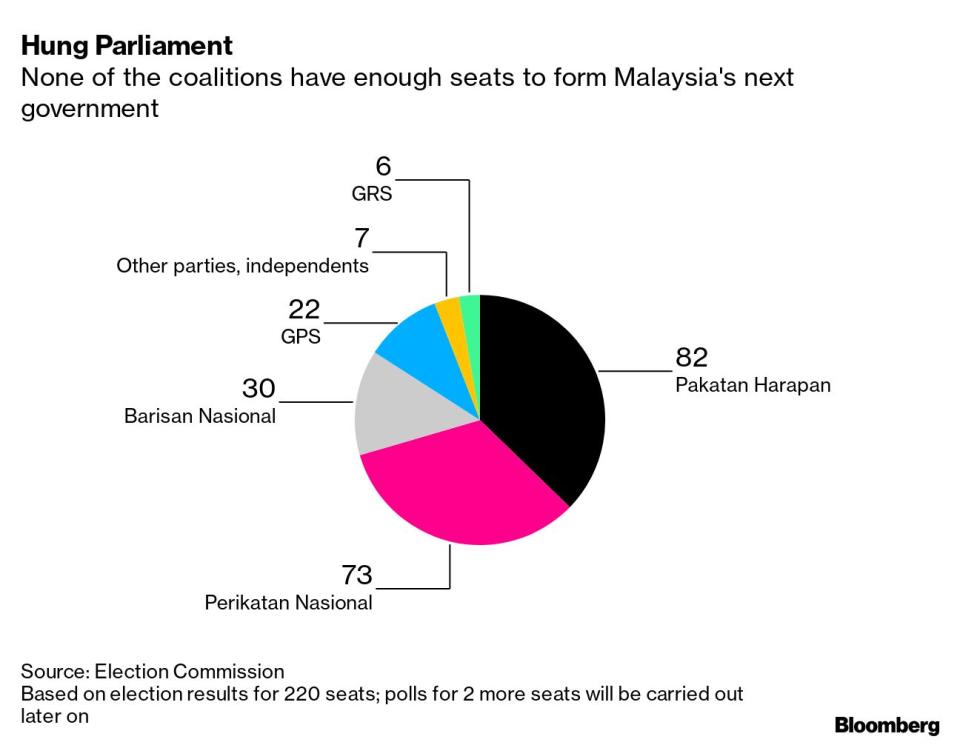Six Key Takeaways From Malaysia’s First-Ever Hung Parliament
(Bloomberg) -- Opposition leader Anwar Ibrahim’s reformist Pakatan Harapan and a pro-Malay rival grouping led by ex-premier Muhyiddin Yassin are competing to form the next government after snap elections led to a hung parliament.
Most Read from Bloomberg
Malaysia Latest: Parties Race to Form Government Before Deadline
Malaysia Latest: Tight Election Race Points to Hung Parliament
FTX Owes Its 50 Biggest Unsecured Creditors More Than $3 Billion
Both must try to cobble together a razor-thin majority by persuading a raft of parties to join their alliance, to become the fourth prime minister in four years. Either way, the political uncertainty which has hobbled the Southeast Asian country looks set to continue at a time when the economy is on a fragile rebound and rising living costs are stirring discontent.
Here are the main takeaways from the election:
Political Crisis Continues
The battle for control of the government will be fought over the next few days. Anwar’s PH coalition has 82 out of 220 seats, the biggest share, followed by Muhyiddin’s Perikatan Nasional with 73. To comfortably surpass the 111 seats needed for a majority, Anwar and Muhyiddin will have to forge alliances with caretaker Prime Minister Ismail Sabri’s Barisan Nasional, regional parties in the states of Sabah and Sarawak on the island of Borneo, as well as a handful of independents. Muhyiddin has publicly ruled out working with PH to form a government.
Context: This is a rerun of the negotiations after the collapse of Mahathir Mohamad’s administration in 2020 and Muhyiddin’s in 2021. Both times, Anwar claimed to have the numbers to form a government, but the pro-Malay coalitions banded together to squeeze him out. Malaysia’s benchmark stock index reflects the brewing political uncertainty, remaining almost 24% below its April 2018 record even after a rebound.
King Steps In Again
Malaysia’s king, picked from nine royal families every five years, could play a major role in determining who forms the government. The palace invited Muhyiddin and Anwar to present plans on Monday to show they have a majority, a similar procedure to when the last two governments were formed. Under the constitution, the king may determine which leader he believes commands a majority, though this would not be tested publicly until parliament meets.
Context: Until the past decade, the monarch’s involvement in politics was unheard of, with one party, the United Malays National Organisation, dominating politics with its allies for six decades following independence. But as UMNO’s control gradually waned, the monarchy has had to step in. Sultan Abdul Samad, the current king, named Muhyiddin as prime minister without a parliamentary vote after Mahathir abruptly resigned in 2020. He stepped in again and appointed Ismail as premier 15 months later when public anger over the government’s handling of the economy and the pandemic forced Muhyiddin to resign.
UMNO’s Historic Losses
The UMNO-led BN alliance clinched just 30 seats -- its worst-ever result. Throughout the campaign, rival parties reminded voters of corruption cases plaguing UMNO President Ahmad Zahid Hamidi and the criminal probe that landed former premier Najib Razak behind bars for his role in the multi-billion-dollar 1MDB scandal. Many Malay voters shifted allegiance to Muhyiddin’s bloc, which pledged to protect their rights while promoting clean governance.
Context: UMNO had called the snap poll to capitalize on success in local elections earlier in the year and what it thought was an opposition in disarray. UMNO has traditionally held onto the traditional Malay heartland states in central and east coast Malaysia but its influence was battered by a resurgent Parti Islam Se-Malaysia, the biggest in the PN alliance.
Inflation Concerns
Anwar’s PH held onto its urban and semi-urban strongholds in peninsular Malaysia, where cost-of-living pressures were foremost on voters’ minds. Yet none of the three major coalitions shed much light during the campaign about how they intended to combat inflation that remains above 4%. Brief mentions of cash handouts from some candidates only raised concern about government spending.
Context: In pre-election surveys, voters had put higher living costs and the economy as their main concern, followed by governance and political stability.
Rise of Islamist Party
Parti Islam Se-Malaysia (PAS) emerged as the single party with the most seats -- 44, exceeding Muhyiddin’s own party in the PN alliance, as it took the religious high ground over UMNO and other pro-Malay groups. Its victories in mostly rural regions put PAS in a strong position to push an Islamist agenda that includes imposing sharia law and banning the sale of alcohol across the multi-ethnic country.
Context: PAS’s long-stated aim is to turn Malaysia into a theocratic state, but in recent years and during the latest election campaign it focused on clean governance with Islamic values in order not to alienate non-Muslims and a new generation of younger voters.
Mahathir Loses
Several political heavyweights lost their seats, including two-time premier Mahathir Mohamad, 97, whose campaign culminated in warnings that voting for Anwar’s or Muhyiddin’s coalitions would destroy the country, without offering a strong alternative vision.
Context: Mahathir had been an outsized influence in Malaysian politics, having run the country for 22 years until 2003, then joining forces with former foe Anwar to oust Najib Razak from power following the 1MDB scandal. He has a fondness for mega-projects including the iconic Petronas Twin Towers and is credited with modernizing Malaysia. But voters had not forgotten that it was Mahathir’s abrupt resignation in 2020 that led to the collapse of the PH government.
Most Read from Bloomberg Businessweek
A Nation in the Crosshairs of Climate Change Is Ready to Get Rich on Oil
Fatal Crashes Highlight Rising Danger of Illicit Charter Flights
Meta Confronts an Apple-Sized Hole in Its Once-Mighty Advertising Business
©2022 Bloomberg L.P.

 Yahoo Movies
Yahoo Movies 







